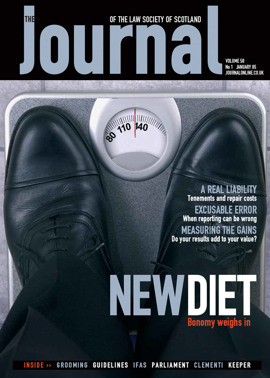Fair pay for liquidators
In January 1989 an order was made for the winding up of RC Hyndman Ltd (“the company”) at the instance of Carol Hyndman as holder of 5% of the share capital, on the grounds that it was just and equitable to do so. On that date Mr Readman was appointed interim liquidator, an appointment subsequently confirmed by a meeting of creditors. No liquidation committee was appointed to act with him and accordingly his remuneration eventually fell to be determined by the court. Ms Hyndman had various complaints regarding the conduct of the liquidation which were litigated in the course of the winding up and which need not trouble us here. In September 1997 the sheriff remitted the account of the liquidator’s intromissions up to 22 August 1997 to an insolvency practitioner “to report what in his opinion is a suitable remuneration”. This is an accepted procedure for fixing a liquidator’s remuneration, but it has taken a further seven years to settle the extent of the remuneration claimed. Although the arguments taken by Ms Hyndman on appeal to the Inner House were not the same as those which she advanced to the sheriff, the Inner House discussion provides the following guidance.
Section 53(4) of the Bankruptcy (Scotland) Act 1985, as applied to the liquidation of companies by the Insolvency (Scotland) Rules 1986, states:
“The basis for fixing the amount of the remuneration payable to the liquidator may be a commission calculated by reference to the value of the company’s assets which has been realised by the liquidator, but there shall in any event be taken into account –
(a) the work which, having regard to that value, was reasonably undertaken by him; and
(b) the extent of his responsibilities in administering the company’s assets.”
Ms Hyndman argued that this gave a primacy to a commission basis and accordingly where no assets had been realised by a liquidator, the appropriate amount of his remuneration could be nil. The court rejected this contention, holding (as set out in the opinion of the court by Lord President Cullen) that the subsection did not create a presumption in favour of the use of the commission basis for the fixing of the amount of the remuneration, let alone make a commission basis mandatory. The use of some other basis did not require to be justified. The matters referred to in subparagraphs (a) and (b) had to be “taken into account”. That did not constitute the test for remuneration, nor did these paragraphs exclude any other consideration.
In the present case, where the assets available for distribution had been realised prior to the liquidator’s appointment, subparagraph (a) was of no real significance and the sheriff was entitled to determine remuneration by reference to subparagraph (b).
The function of the reporter was to advise the court on the reasonableness of the liquidator’s claim for remuneration. His function was not to undertake an audit of the liquidator’s work, nor was it to provide further specification of the work carried out and the proposed charge for each item of that work. In this respect the court followed the approach adopted by Sheriff Thomson in the case of Sonido Investment Ltd 1991 SCLR 874.
In considering a note seeking remuneration the court was to consider that request in the light of the work which had been done by or on behalf of the liquidator. The court was not concerned at that stage with any further work which the liquidator might have done, nor with any complaints which an objector might have to the work which had or had not been done. These had no bearing on the remuneration to be determined by the sheriff.
At first instance, Sheriff Scott set out a detailed note of the arguments put to him by both parties and his reasoning (see 2003 SLT (Sh Ct) 51). This is now expanded upon by the decision of the Inner House delivered by Lord Cullen. The opinions helpfully summarise and address a number of earlier, somewhat shorter, reports, as far back as 1907. This decision is therefore a very useful reference point for those concerned with obtaining remuneration and for those reporting upon the request.
Alistair Burrow, Tods Murray LLP
In this issue
- Riding the wave of change
- Last stand for the defence
- Losing the wait
- What right to be wrong?
- Prevention as the cure
- No room for half measures
- Poles apart
- Get IT right
- The value proposition
- A time for resolution
- When it falls, it falls
- Round the houses
- Private bills and public interest
- Charging Peter to pay Paul
- Fair pay for liquidators
- Website reviews
- Book reviews
- Fair notice?
- The new title conditions






